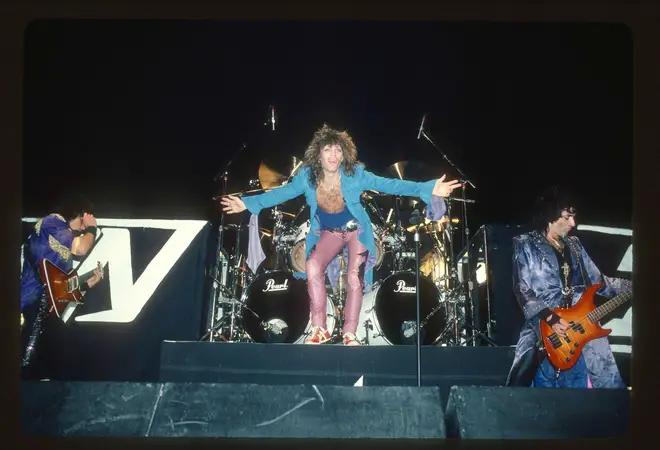September 16, 2024
 Jon Bon Jovi performing on stage in 1986.
Jon Bon Jovi performing on stage in 1986.
Jon Bon Jovi, the iconic frontman of the legendary rock band Bon Jovi, recently shared a surprising revelation about the band’s chart-topping anthem, “Livin’ on a Prayer.” In a candid interview, he admitted that the song, which went on to become synonymous with the band’s success, didn’t initially strike a chord with him.
From Humble Beginnings to Global Phenomenon: The Making of a Rock Anthem
It was the mid-1980s, and Bon Jovi, a band brimming with raw talent and ambition, was on the cusp of a breakthrough. Their third studio album, “Slippery When Wet,” was about to be unleashed upon the world, carrying with it the potential to catapult them to superstardom.
Their previous singles had achieved moderate success, but “You Give Love A Bad Name,” the album’s lead single, soared to the top of the US charts, signaling the arrival of a musical force to be reckoned with.
However, it was the album’s follow-up single that would become a defining moment in their career – a song etched into the annals of rock history and embraced by generations of fans: “Livin’ on a Prayer.”
A Song That Almost Wasn’t: Jon Bon Jovi’s Initial Hesitation
The song’s journey to becoming an anthem was far from ordinary. In a recent interview with People magazine, Jon Bon Jovi confessed that “Livin’ on a Prayer” wasn’t an instant hit with him.
“It wasn’t that I didn’t want to record it,” he clarified, “but I wasn’t all that impressed on the day that we wrote it.”
The simplicity of the chord progression, the melodies, and even the lyrics failed to ignite a spark in him initially. It seemed like just another day at the office, a good song, but not one destined for greatness.
The Magic of Collaboration: How “Livin’ on a Prayer” Found its Groove
The song’s transformation from a good track to an epic anthem unfolded during the demo recording process. Jon Bon Jovi recalled, “The bass line came to life in the demo studio, when we took it back to the band and worked it up. That’s how it became what it is.”
The band, recognizing the song’s latent potential, collaborated to breathe life into it. The bass line, added later, became the driving force, injecting an infectious energy that resonated with audiences worldwide.
Despite his initial reservations, Jon Bon Jovi acknowledged the undeniable impact of “Livin’ on a Prayer,” stating, “It’s one of the biggest songs in our catalogue.”
The Desmond Child Factor: Crafting Stadium Anthems
The involvement of renowned songwriter Desmond Child proved pivotal in shaping Bon Jovi’s sound and propelling them to stadium-filling fame. Child, known for his work with rock legends KISS, brought his expertise in crafting anthemic hits to the table.
He had a formula for creating songs that would connect with massive audiences: “Paul Stanley taught me how to write stadium anthems the Kiss way, in which the protagonist is always the winner,” Child explained. “There’s always victory. And the music is also lifting constantly upwards. I used those kinds of ideas or feelings in my collaborations with Jon Bon Jovi and Richie Sambora for the band Bon Jovi. The most perfect example of that is ‘Livin’ on a Prayer.'”
The song became an embodiment of working-class aspirations and resilience. It spoke to the dreams, struggles, and triumphs of everyday people striving to make their mark. “The message is, you work hard, you build your life, and you achieve the ‘American Dream’, ” Child reflected. “You can make it.”
 Jon Bon Jovi and Richie Sambora performing on stage in their early days
Jon Bon Jovi and Richie Sambora performing on stage in their early days
A Legacy Forged in Rock: The Enduring Appeal of “Livin’ on a Prayer”
“Livin’ on a Prayer” transcended musical boundaries to become a cultural phenomenon. Its message of hope, resilience, and unwavering belief in one’s dreams continues to resonate with audiences across generations.
The song’s enduring legacy is a testament to the power of collaboration, the magic of a captivating melody, and the enduring spirit of rock and roll. It stands as a reminder that even the most iconic anthems can have humble beginnings and that sometimes, the songs we least expect to become legendary are the ones that touch our souls most profoundly.



